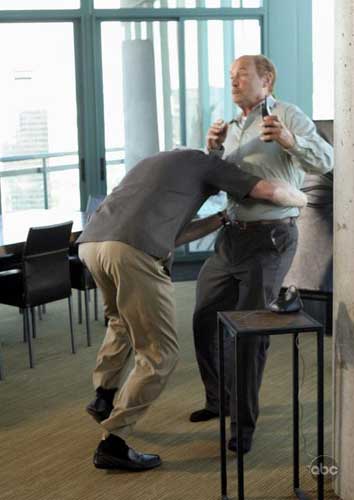This is an excellent and interesting post of the nature of modern masculinity, a post that starts with a riff on the TV show "Lost," which I have never seen. Daisy (at Dear Diaspora) makes some good points, worthy of being shared here.
Before the crash of Oceanic Flight 815, John Locke had some serious father issues. First, his dad abandoned him as a child. As an adult, he finally reunites with him, but instead of hugs and tears of joy, John’s dad cons John out of a kidney and then abandons his son once more. Later on, John Locke and his dad cross paths again and Locke is this time greeted with a shove out the window of an eight story building. Consequently, Locke becomes paralyzed. But hey! There’s nothing like being stuck on some mysterious island to work through all these daddy issues!
Of course, when she says "masculinity," she's talking about traditional masculinity - and I think what she would like to see more of is an evolved, mature, and compassionate masculinity.
Father-Trauma And The Gender System (Or, Traditional Masculinity Is The Problem, Not The Solution)
April 17, 2009(Don’t worry, this post actually has nothing to do with Lost — it’s just what started the train of thought. The post will make sense even if you’ve never seen a second of the show.
Also, I have the eerie feeling that I’ve heard these ideas elsewhere, but I can’t figure out where. The closest I can find is this excellent post by Hugo about why we need a White House council on men and boys. Hmm.)
This week’s episode of Lost had absent fathers as one of its major themes. Daddy issues are a recurring concern on Lost; virtually every character has some kind of major father-related trauma. One of the main characters murdered her abusive step-dad (Kate), one watched his father murder his mother and then commit suicide when he was small child (Sawyer), one was profoundly emotionally neglected by his workaholic, alcoholic father (Jack), another was abandoned by this same man (Claire), another two were also literally abandoned by their fathers (Miles and Hurley). A whopping three characters have evil, billionaire super-manipulators who are hellbent on keeping their daughters away from the men they love as fathers (Sun, Penny and Alex). And that’s not even mentioning the fraught issues the characters have with their own kids (see Sawyer and Michael)
What I want to talk about here is the role that traditional masculinity plays in causing such problems. Conservatives often observe that fatherlessness is, arguably, epidemic at this point, and, arguably, causing countless problems. Their solution, of course, is traditional gender roles: straight marriages, with masculine, bread-winning fathers and feminine, care-taking mothers. In essence, more traditional masculinity will solve this problem — if men would only “man up,” things would be fine.
But this fairly widespread neglect and abandonment (whether emotional or physical) is a symptom of traditional masculinity, not the result of a dearth of it. There are some aspects of traditional masculinity that make for good parenting: courage, protectiveness, providing material necessities. The others, though, set men and families up for failure: being a workaholic, being unable to express emotions (like, you know, love), being violent, being a disciplinarian (and nothing else).
Father-trauma is caused by men over-performing masculinity, not under-performing it (and, of course, by the society that encourages and even demands this). No one is walking around with daddy issues because their father wasn’t macho enough.
No one spends years in therapy trying to cope with a dad who hugged her, packed her lunch, braided her hair; no one is devastated by a father who shows his emotions or tells him that he loves him. Lives are mangled by deadbeat dads, workaholics and abusers — not by stay-at-home dads. Traditional masculinity is the problem, not the solution.
Looking back at the list of daddy issues in the first paragraph — or looking around at the world* — it’s plain to see that every one of the commonly occurring kinds of father-trauma is rooted in the gender system. Physical violence as part and parcel of manhood; being a bread-winner to the total neglect of one’s relationships; the idea that fathers are not as important as mothers,** so fathers can walk away — or be pushed out.
I’m not trying to say that there aren’t some very traditionally masculine men who are good fathers, or that all fathers’ mistakes can be blamed on the gender system. I’m saying that, to the extent there is a link between masculinity and father-related problems (and I think it’s clear that there is one), it is a link caused by the hegemony of the gender system, not by folks who dissent from it. The solutions will come from extensive reworkings of masculinity, femininity, and the mechanics of the system itself, not from increased enforcement of gender norms.
* My girlfriend jokes that I’m the only person in the world without daddy issues. I wish this were much more of an exaggeration than it apparently is!
** It’s probably obvious, but: I do not think a person’s gender is relevant to her parenting ability. I’m not trying to say that fathers are critical because of their chromosomes, I’m trying to say that fathers are critical because their kids love them and need them, and that mothers are not more important by dint of their wombs. A child who’s always had two moms or two dads needs those two people; that’s totally different from the only father a kid has ever known skipping town, or being incapable of honest relationship.

No comments:
Post a Comment